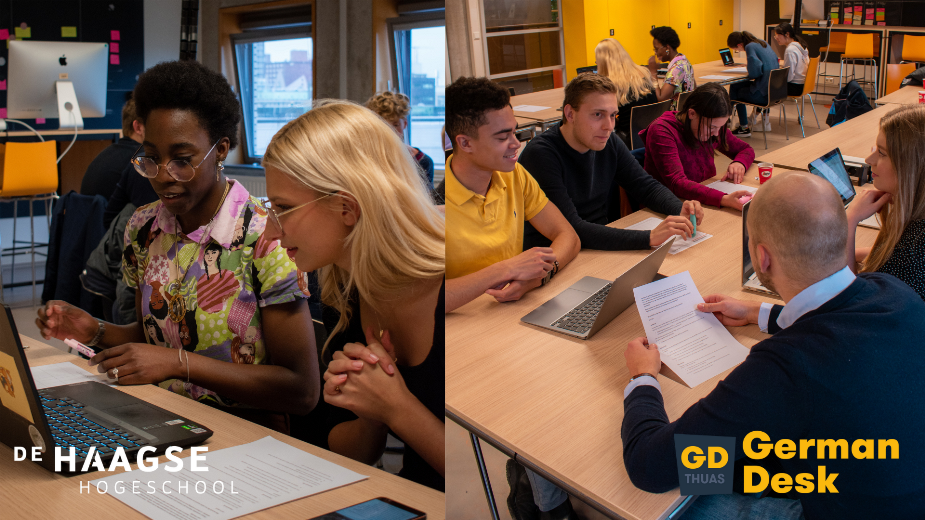The German Desk: students active for SME in The Hague and surroundings

Imagine: you get into a conversation with someone. That person asks you what you are doing. "I am a student." "So, you're in classes all day?" You: “No, I will make sure that the company I work with seizes as many opportunities as possible on the German sales market.” Wow! Can you hear the startled silence? But thát is exactly what you do when you are part of the German Desk as a student. An animated conversation with students who enjoy the dynamics of innovative education.
‘In this minor you are constantly faced with new challenges’
The German Desk. A living lab without white coats. It is the name of a minor, organized by the European Studies program in collaboration with the Centre of Expertise Global Governance and the Changing Role of Europe research group of The Hague University of Applied Sciences.. And it is a partner of the new SME deal International Business. With this deal the municipality of The Hague and educational institutions want to stimulate, facilitate and advise local SMEs in their efforts to become more active on the German market.
Only winners
Steven van Deursen, Pola Janusz, Ole Koopmans and Floris van Ommen are studying European Studies. Now, they are active for this very practical minor. Where they need help, they can always rely on Tolgan Raben, director of the German Desk. Pola: “We gain a lot of experience at companies and can make our knowledge there useful at the same time.” SMEs are grateful for their input to take the step towards international business. And doing international business is an opportunity for The Hague region to shift the economic engine into a higher gear. So, The German Desk only has winners.
Research and advising
Steven: “Doing business in Germany seems less complicated than doing business in Southeast Asia. However, as a Dutch company you have to deal with different laws and regulations in Germany.” Ole: “Companies are organized differently in Germany than here. The business culture is also different. So, it is quite a step for companies to become successful on the German market.”
The four students work for different companies. For example, Floris works for a company that wants to make data accessible very quickly with artificial intelligence. Floris: “That is very relevant for Germany now, because the newly installed government really wants to take digitization within the government to a higher level. The company I work for wants to use that momentum as much as possible.”
New forms of collaboration
The German Desk reinforces the educational component in the triple helix innovation model. Pola: “In that model, the university of applied science, businesses and the government work together to promote economic and social development. The triple helix is prominent in Germany. Each of us has to deal with that. We are looking for new forms of cooperation, to give our clients access to the German sales market.”
The German Desk was launched in September 2021. A project in development. Pola: “That's what makes it so challenging. We develop new things. We talk with our lecturers about new formats. I really appreciate that co-creation process.” Steven: “Our feedback and suggestions matter. The German Desk should be student friendly. We need to gain as much experience as possible. Get as many opportunities as possible to learn and grow.”
Every assignment a challenge
Ole: “It is very important for us to do a practical minor that really prepares us for our future profession. Most of us are going to do an internship in the next semester. The German Desk is an excellent preparation for that internship.” Floris: “This minor is so dynamic that you are constantly faced with new challenges. Every new assignment is a new challenge.” Steven: “We do the work of account managers at companies and practice the professional skills that we will need in the future.” Ole: “Every assignment concerns a real problem. What is currently happening in Germany and how can a Dutch company respond to this problem?”
Co-creation with New Designers
Jané works as a Communication and Media Design student at the student driven agency New Designers. “The German Desk has asked us to design a beautiful website. We discussed the content and look and feel of the website in several sessions. We are now busy designing. That too is a process of co-creation.”
“This assignment is not finished for me until the website really meets the marketing needs of the students. Is it useful to the students? Does the website provide sufficient response? Those things are very important to me.”
The Hague University of Applied Sciences shows her social relevance with the German Desk. For this minor she got a Comenius Teaching Fellow grant: a great financial incentive to further develop the German Desk.